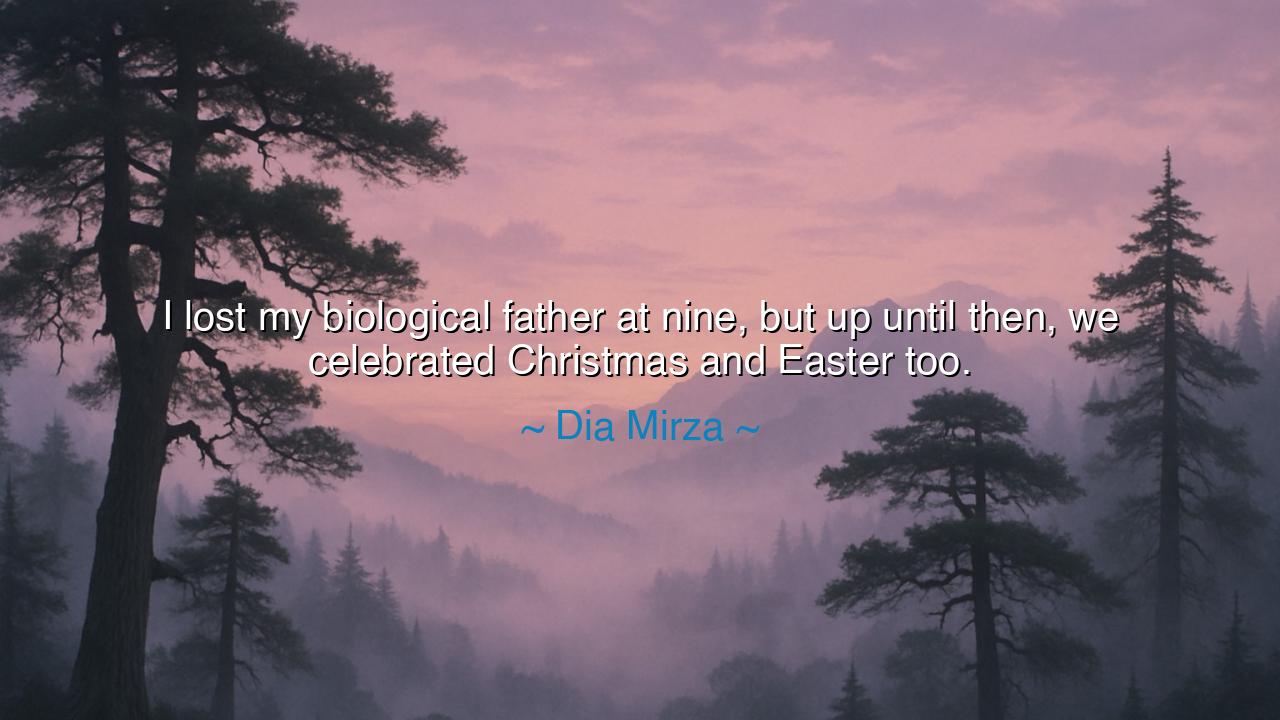
I lost my biological father at nine, but up until then, we
I lost my biological father at nine, but up until then, we celebrated Christmas and Easter too.






In the tender and heartfelt words of Dia Mirza, we hear the echo of love, loss, and remembrance: “I lost my biological father at nine, but up until then, we celebrated Christmas and Easter too.” These are not the words of sorrow alone, but of reverence — a daughter recalling the warmth of a world that once was whole. Beneath their simplicity lies a profound reflection on the endurance of love, the unity of faith, and the way memory transforms grief into grace. For in these few words, Mirza captures a truth known since the dawn of humanity — that what is loved, once shared, never dies.
The origin of this quote lies in Mirza’s own life — the story of a child raised in a home where love transcended boundaries of religion and tradition. Her father, a Christian, passed away when she was still young, leaving behind memories of candlelight, hymns, and gentle celebrations of Christmas and Easter. Yet even after his passing, those memories lived on — not as rituals, but as symbols of connection. In remembering him, she remembers the joy he brought; in celebrating, she honors the bridge he built between worlds. Thus, her words speak not only of personal loss but of something eternal — the endurance of heritage, and the way love threads itself through the seasons of our lives.
In her remembrance of Christmas and Easter, Mirza invokes two of humanity’s most profound symbols — birth and resurrection. The one marks beginnings, the other renewal; together they form a cycle of hope that has spoken to hearts across centuries. By mentioning them, she reminds us that even in loss, there is life; that even in the silence after death, something divine whispers: “Love does not end here.” Her father may have departed, but the spirit of celebration — the unity, the compassion, the faith — remained, reborn in her memory each year, like Easter’s dawn after Good Friday’s sorrow.
This truth finds its mirror in the story of Antigone, the daughter of Oedipus, who defied a king’s decree to honor her dead brother with burial rites. She understood, as Dia Mirza does, that remembrance is sacred — that to forget the past is to lose a part of one’s own soul. In performing her quiet act of love, Antigone became immortal in spirit, just as Mirza keeps her father alive through the recollection of their shared faith and joy. For what we honor in memory, we preserve in eternity.
And yet, her words speak not only of the personal but of the universal. In saying that they celebrated Christmas and Easter too, Mirza quietly challenges the divisions of creed and culture. She reminds us that love is not bound by faith, nor by blood, nor by custom. Her childhood home was a place of harmony, where festivals were not barriers but bridges — moments when different faiths could meet at the common altar of kindness. In this, her father’s legacy becomes a lesson for all generations: that the divine speaks in many tongues, and every celebration of goodness belongs to all humanity.
We must learn, as she learned, that grief does not destroy the heart — it expands it. The loss of her father became the soil from which gratitude grew. Instead of turning inward to pain, she turned outward to remembrance, carrying forward his light through acts of love and through the stories she tells. For this is the alchemy of the soul: that sorrow, when touched by memory and faith, becomes something luminous. Like gold refined by fire, it gleams more brightly after suffering.
So, children of time, take heed of this teaching: cherish the traditions that bind your hearts, not because they are perfect, but because they are threads of connection to those who came before you. When you celebrate, remember. When you grieve, give thanks. Let every festival — whether Easter, Christmas, Diwali, or Eid — become not merely a ritual of joy, but a song of remembrance for those who shaped your spirit.
And finally, learn this: love that is expressed becomes eternal. Dia Mirza’s words are a living testament to that truth. Though her father’s life was brief in her childhood, his influence remains, woven into her traditions, her compassion, her being. So too can each of us keep alive what time seeks to take — by remembering, by celebrating, by living with gratitude. For though death may silence the voice, love ensures that the song continues, carried forever in the hearts of those who listen.






AAdministratorAdministrator
Welcome, honored guests. Please leave a comment, we will respond soon